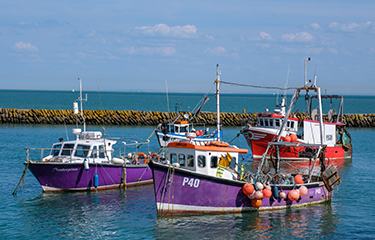The profitability of U.K. fishing vessels declined in 2022, with a rise in fish prices that drove higher revenues failing to outweigh the myriad difficulties faced by the industry last year.
According to information from U.K. public body Seafish’s annual fishing fleet survey for 2022 and its dataset showing the annual economic performance of the fleet in 2021, the size of the U.K. fleet decreased year over year in both 2021 and 2022, with just under 4,080 vessels active last year. Of that number, Seafish deemed around 1,300 as “low-activity” vessels reporting an annual income of less than GBP 10,000 (USD 12,600, EUR 11,700).
Comparing datasets from the two previous years, Seafish’s 2022 preliminary estimates paint a picture of a fleet still struggling to emerge into a brighter post-pandemic landscape, with many vessels surveyed reporting that financial struggles remain a major concern.
The survey determined that the effects of Covid-19 and associated lockdown measures – combined with new trade requirements following Brexit – continued to impact the fleet in the first part of 2021. However, indications of economic recovery arose by the second half of 2021 as prices and demand recovered. Total operating profit of the fleet in 2021 totaled GBP 256 million (USD 323.1 million, EUR 299.4 million), a 5 percent increase from 2020 but still below 2019’s GBP 267 million (USD 337.4 million, EUR 312.2 million).
Seafish said that in 2022, the start of the Ukraine war and subsequent rise in fuel prices “dramatically altered the landscape.”
It estimated that total spending on marine fuel last year amounted to GBP 195 million (USD 246.4 million, EUR 228 million), which represented a 75 percent increase year over year. As fuel prices increased, total operating costs also soared, reaching the highest figure in the last four years.
Rising costs on gear, packaging, and insurance put further pressure on fishing businesses, negatively impacting vessel owners nationwide, the survey showed.
The silver lining to emerge from 2022 for the industry was that market prices for many wild-caught species increased, with Seafish reporting that the average prices for nephrops (langoustines) and scallops increased by 39 percent and 18 percent per metric ton (MT), respectively. With regards to whitefish, monkfish and saithe average prices increased 12 percent and 50 percent, respectively. The average price of cod also stayed comparable to the high prices seen in 2021.
This translated to higher revenues for the fishing sector, with the fleet’s total sales estimated at around GBP 1 billion (USD 1.3 billion, EUR 1.2 billion), a figure similar to pre-Covid and pre-Brexit numbers.
With cost-of-living and fuel prices rapidly escalating, though, profits dropped, with the fleet making 13 percent less profit than in 2021 and 17 percent less than in 2019.
Seafish’s Economics, Insight, and Advice team told SeafoodSource that North Sea and West of Scotland (NSWoS) demersal seiners and nephrops segments were among those to see the greatest per-day increase in fishing income at sea in 2022 compared to the previous year thanks to higher average prices. It also advised that while the increase in fuel costs impacted all U.K. fishing vessels, the impact was slightly lower for vessels using pots and traps and smaller vessels (under 10 meters) using static gear.
Seafish Economics Analyst Marta Moran-Quintana summarily said the public body’s preliminary economic estimates showed that 2022 was “another difficult year” and that the rise in fuel prices had “a significant effect,” only partially offset by a global shortage of whitefish due to the Russian-Ukrainian conflict. Sanctions on Russian seafood increased average prices of ...
Photo courtesy of Marc Bruxelle/Shutterstock








